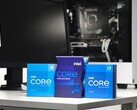Desktop PC builders are in for something of a treat over the next few months. AMD has impressed everyone with its Zen 3 processors that were launched in November 2020, revealing performance gains that made Ryzen 5000 very appealing to those concerned with single-core or single-thread processing. As a very general rule of thumb, AMD tends to offer parts with stronger multi-core performance while Intel has been the choice for single-core processing. But Team Red upset the apple cart with the Ryzen 5950X et al by launching CPUs that offered up to 16 cores for powerful multi-core processing and also with single-core gains useful for gaming.
This has led to the Ryzen 5950X, Ryzen 7 5800X, Ryzen 9 5900X, and Ryzen 5 5600X currently leading the single-core benchmark chart at Geekbench, with average scores from 1,602 points up to 1,680. While there has been some press about Rocket Lake from Intel being either dead on arrival or simply a stop gap before the 10nm Alder Lake series comes along, there have been some leaks concerning the top-end Intel Core i9-11900K and i7-11700K that have made them potentially attractive prospects, regardless of your personal feelings about either of the two companies involved in this seemingly bitter and never-ending struggle for processor market share dominance.
While the Intel Core i9-11900K has apparently been hidden from Geekbench leaks, you can expect it will churn out some mighty scores. In early December a mysterious Intel processor was put through Geekbench 5.3 and returned 1,645 points. Some jumped to the conclusion that this was an i9-11900K engineering sample, but the measured boost clock of 4.98 GHz actually pointed to it possibly being the Intel Core i7-11700K. Now that latter CPU has appeared on Geekbench a few times, and all four of the currently accessible records show single-core scores over 1,800 points. Obviously it’s going to take a lot more tests before an average mark for the Rocket Lake-S part can be entered into the benchmark chart, but it seems likely it will overtake the Zen 3 processors.
You can presume the i9-11900K will offer even greater single-core performance than its stablemate, with the 8-core chip capable of boosting to 5.3 GHz (single core) and leaked results in various other synthetic benchmarks showing it to be something of a performance beast. There’s also the fact that the Rocket Lake-S processors might come in at a reasonable prices, which may balance the additional power cost that Intel chips invariably suffer from. Intel has already been demonstrating just how strong the Core i9-11900K is for gaming, with both that CPU and the i7-11700K looking like they could actually compete against the AMD Ryzen 5000 parts that are already currently available.




























